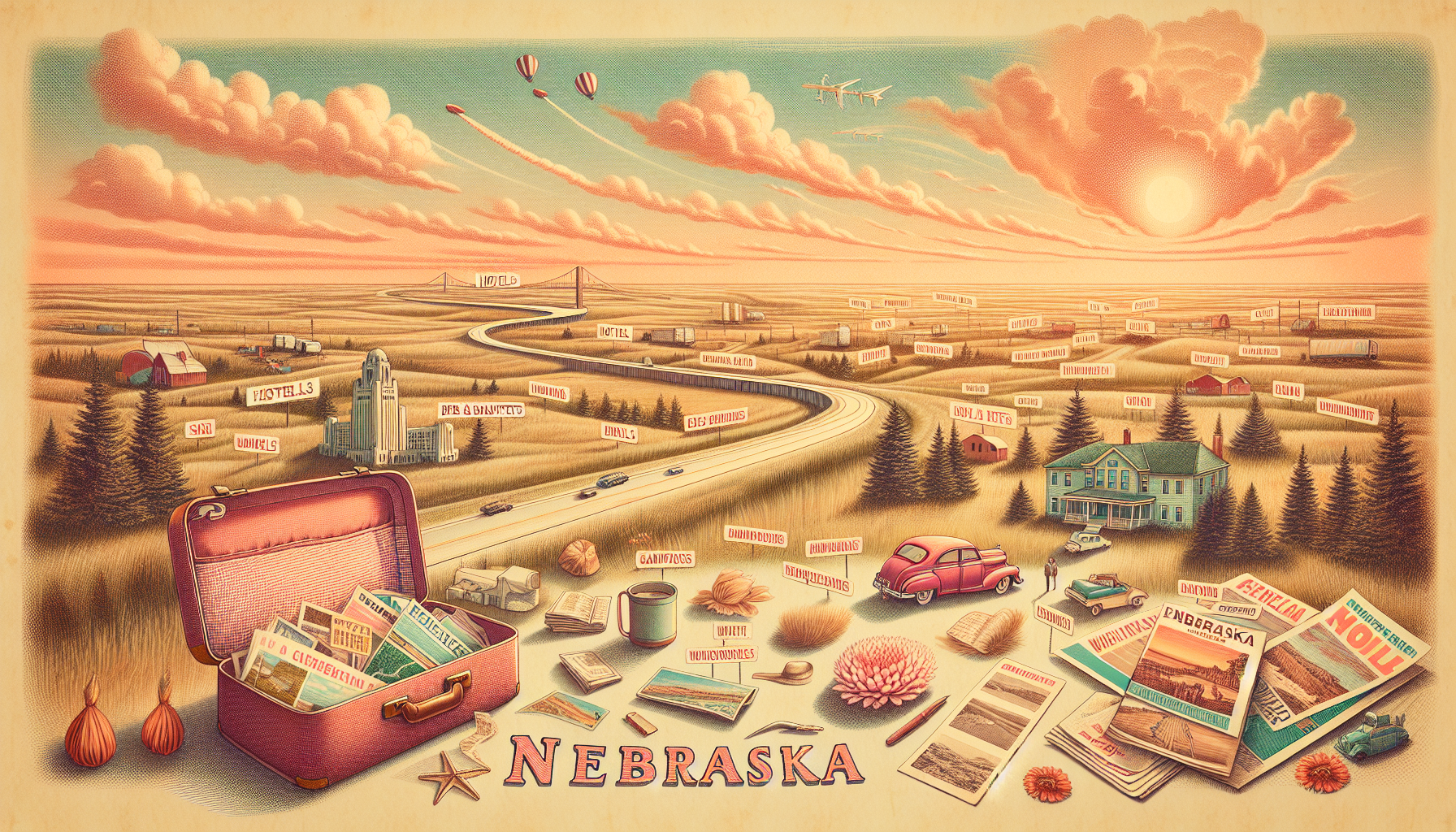Nebraska's Urban Farm Movement Revolutionizes Food Systems

In the heart of America's agricultural landscape, a unique urban farming movement has taken hold in Nebraska, a state better known for its rolling cornfields and rural expanses. Fueled by innovative projects and pioneering farmers, this grassroots movement seeks to redefine the relationship between cities, food, and the environment. From bike-powered compost initiatives to vibrant community gardens, Nebraska's urban farms are working tirelessly to make fresh produce more accessible to underserved neighborhoods and foster a new era of sustainability in the Cornhusker State.
Traveling north through Omaha, the state's largest city, one encounters a kaleidoscope of projects showcasing the diversity and creativity of Nebraska's urban farm scene. No More Empty Pots, a local nonprofit organization, operates an innovative urban farm in North Omaha's Kennedy neighborhood, which provides job training, business skills, and a fresh produce CSA (Community-Supported Agriculture) program for under-resourced residents. Utilizing an assortment of greenhouses, vertical farms, and mobile markets, this ambitious endeavor exemplifies the farm's commitment to integrating sustainable agriculture, education, and community outreach.
Omaha also boasts Big Muddy Farms, a unique urban farm situated on the grounds of Girls Inc. of Omaha. Under the expert guidance of farm manager Brent Lubbert, this small but dynamic project cultivates a diverse assortment of fruits and vegetables, offering over 40 city youth employment opportunities, educational workshops, and hands-on farming experience. By emphasizing experiential learning, environmental stewardship, and nutrition awareness, Big Muddy inspires a new generation of young leaders to become involved in the urban agriculture movement.
Meanwhile, in the state capital of Lincoln, The Campus Creamery at the University of Nebraska-Lincoln provides farm-to-table enthusiasts with a remarkable example of Nebraska's renowned dairy tradition merged with urban farming innovation. Situated just a short walk from downtown Lincoln, this research facility showcases artisanship dairy production and generates unique artisanal products for the campus community. Integrated into the university's food system, this initiative supports local small-scale agriculture and underscores the intrinsic value of interdisciplinary collaboration in innovation and sustainability.
Furthermore, various university-led projects, educational institutions, and community networks throughout the state underscore the importance of synergy in creating workable, climate-resilient urban farm systems. Partnerships like the Eastern Midlands Climate Awareness network (EACAT) allow urban farming innovators to share knowledge and experience in agriculture-based economic development. These cross-regional collaborations offer new models to alleviate food deserts and propel forward-thinking sustainable development policies.
Across the state's urban landscapes, key partners like local cooperatives and nonprofit organizations also drive educational initiatives focused on food systems transformation and a resilience-based toolkit for Nebraska's agricultural entrepreneurs. The Great Plains Trails Network – interlacing urban farms, parks, waterways, and wildlife reserves with a vibrant tapestry of bike trails and green infrastructure – serves as a compelling example of harmonious coexistence between human and environmental interests. Such frameworks stress that each urban farm reflects unique historical contexts and specific regional realities, challenging and revolutionizing food production while seeking systemic impact through grassroots activism.
Moreover, to help urban farmers and fledgling food entrepreneurship become embedded in local development, urban planners strive for more inclusive zoning policies, an attempt to marry zoning principles and sustainable urban agriculture growth in the next generation of development. Over time, this has translated to public policy modifications that permit on-site farm sales, public benefits for growers operating within mixed use areas and shared urban spaces. Allowing the transformation of once-vacant lots into beacons of growth, community development offices around Nebraska increasingly prioritize urban food innovation and dynamic local engagement.
To help Nebraska further thrive as a 21st-century agricultural hub, networks, neighborhoods, universities and public infrastructure initiatives provide a mosaic of models to produce fresh groceries, boost nutritional diversity and bolster agriculture-based innovation, proving without doubt that vibrant urban agrarianism can be intricately connected with economic resilience and progressive resource savings.
Traveling north through Omaha, the state's largest city, one encounters a kaleidoscope of projects showcasing the diversity and creativity of Nebraska's urban farm scene. No More Empty Pots, a local nonprofit organization, operates an innovative urban farm in North Omaha's Kennedy neighborhood, which provides job training, business skills, and a fresh produce CSA (Community-Supported Agriculture) program for under-resourced residents. Utilizing an assortment of greenhouses, vertical farms, and mobile markets, this ambitious endeavor exemplifies the farm's commitment to integrating sustainable agriculture, education, and community outreach.
Omaha also boasts Big Muddy Farms, a unique urban farm situated on the grounds of Girls Inc. of Omaha. Under the expert guidance of farm manager Brent Lubbert, this small but dynamic project cultivates a diverse assortment of fruits and vegetables, offering over 40 city youth employment opportunities, educational workshops, and hands-on farming experience. By emphasizing experiential learning, environmental stewardship, and nutrition awareness, Big Muddy inspires a new generation of young leaders to become involved in the urban agriculture movement.
Meanwhile, in the state capital of Lincoln, The Campus Creamery at the University of Nebraska-Lincoln provides farm-to-table enthusiasts with a remarkable example of Nebraska's renowned dairy tradition merged with urban farming innovation. Situated just a short walk from downtown Lincoln, this research facility showcases artisanship dairy production and generates unique artisanal products for the campus community. Integrated into the university's food system, this initiative supports local small-scale agriculture and underscores the intrinsic value of interdisciplinary collaboration in innovation and sustainability.
Furthermore, various university-led projects, educational institutions, and community networks throughout the state underscore the importance of synergy in creating workable, climate-resilient urban farm systems. Partnerships like the Eastern Midlands Climate Awareness network (EACAT) allow urban farming innovators to share knowledge and experience in agriculture-based economic development. These cross-regional collaborations offer new models to alleviate food deserts and propel forward-thinking sustainable development policies.
Across the state's urban landscapes, key partners like local cooperatives and nonprofit organizations also drive educational initiatives focused on food systems transformation and a resilience-based toolkit for Nebraska's agricultural entrepreneurs. The Great Plains Trails Network – interlacing urban farms, parks, waterways, and wildlife reserves with a vibrant tapestry of bike trails and green infrastructure – serves as a compelling example of harmonious coexistence between human and environmental interests. Such frameworks stress that each urban farm reflects unique historical contexts and specific regional realities, challenging and revolutionizing food production while seeking systemic impact through grassroots activism.
Moreover, to help urban farmers and fledgling food entrepreneurship become embedded in local development, urban planners strive for more inclusive zoning policies, an attempt to marry zoning principles and sustainable urban agriculture growth in the next generation of development. Over time, this has translated to public policy modifications that permit on-site farm sales, public benefits for growers operating within mixed use areas and shared urban spaces. Allowing the transformation of once-vacant lots into beacons of growth, community development offices around Nebraska increasingly prioritize urban food innovation and dynamic local engagement.
To help Nebraska further thrive as a 21st-century agricultural hub, networks, neighborhoods, universities and public infrastructure initiatives provide a mosaic of models to produce fresh groceries, boost nutritional diversity and bolster agriculture-based innovation, proving without doubt that vibrant urban agrarianism can be intricately connected with economic resilience and progressive resource savings.
